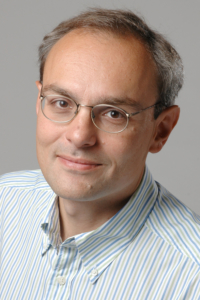Panos Papadopoulos
Professor of Mechanical Engineering
Byron and Nishkian Professor of Structural Engineering
Director of Aerospace Engineering Programs

Email: panos@berkeley.edu
Phone: (510) 642-3358
Office hours: Located at 6131 Etcheverry Hall
Tuesday 4:00 - 6:00 PM
Thursday 4:00 - 6:00 PM
Berkeley, CA 94720-1740
About
For more information see: Computational Solid Mechanics Lab
Research
Research interests include continuum mechanics, computational mechanics, contact mechanics, computational plasticity, materials modeling, solid mechanics, applied mathematics, dynamics of pseudo-rigid bodies.
Computational Plasticity
This research focuses on finite element-based methods for the simulation of problems of infinitesimal and finite plasticity within the context of the strain-space formulation. Research in infinitesimal plasticity concentrates on issues of stability and accuracy of the algorithms used in the integration of the underlying differential/algebraic equations, as well as solveability issues concerning non-associative models. Research in finite plasticity concerns the derivation and numerical implementation of theoretically sound and physically plausible models for analysis of the elastic-plastic response of metallic bodies that undergo finite deformations.
Materials Modeling
This research concerns the combined experimental, analytical and computational study of superelasticity in metal alloys, especially NiTi and CuZnAl.
Contact/Impact for Finitely Deforming Solids
This research concerns the development and analysis of finite element-based methods for the solution of contact/impact problems between bodies that may undergo large motions and deformations. Much of the work concentrates on formulations that employ Lagrange multipliers to enforce the constraint(s) of impenetrability. Emphasis is placed on the development of methodologies that are rigorous, robust and suitable for large-scale computations.
Continuum Mechanics
Various aspects of continuum mechanics are researched, especially in connection with problems of computational interest. Current specific interests include: development of fibrous solid models to analyze the mechanical response of penetration-resistant materials, such as Kevlar.
Dynamics of Pseudo-Rigid Bodies
Research in the dynamics of coarsely deformable continua, such as pseudo-rigid bodies, is driven by the need to develop inexpensive, yet sufficiently accurate models of particulates that may undergo “long” motions involving boundary interaction (i.e., contact). Representative applications include the flow of rocks, sands, and aggregates, the dynamics of traffic accidents involving platoons of vehicles, etc.
Education
Ph.D. Civil Engineering, University of California, Berkeley, December 1991
M.S. Civil Engineering, University of California, Berkeley, May 1987
Dipl. Civil Engineering, Aristotle University, Thessaloniki, Greece, July 1986
Experience
7/1/04 – present : Professor, University of California, Berkeley
7/1/98 – 6/30/04 : Associate Professor, University of California, Berkeley
7/1/92 – 6/30/98 : Assistant Professor, University of California, Berkeley
1/1/92 – 6/30/92 : Post-Doctoral Researcher, University of California, Berkeley
8/1/91 – 12/31/91 : University Lecturer, University of California, Berkeley
1/1/88 – 8/31/91 : Graduate Research Assistant, University of California, Berkeley
8/1/87 – 5/31/90 : Graduate Student Instructor, University of California, Berkeley
Publications
To view a list of Professor Professor Papadopoulos’ publications, please visit the Computational Solid Mechanics Lab website.
